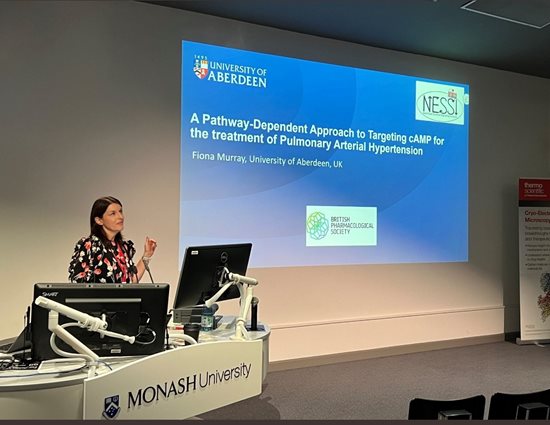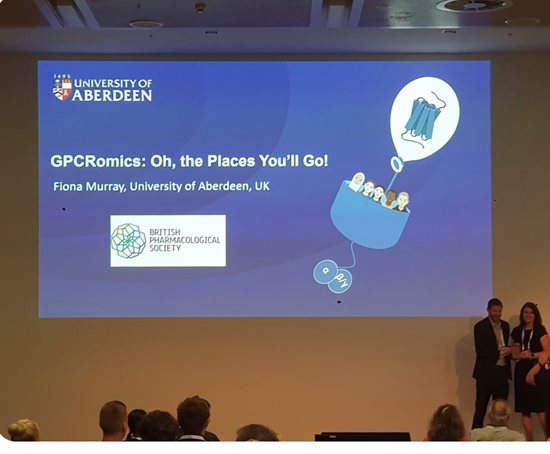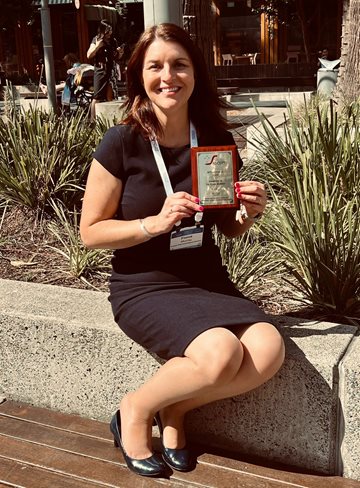For nearly two decades, I’ve been an active, full member of the British Pharmacology Society (BPS) and regularly attend the BPS annual meeting. As a lecturer at the University of Aberdeen, I take pride in helping select our final-year student for the Undergraduate BPS Pharmacology Prize. In 2023, I was awarded funds from the BPS to help organise the 26
th Scottish Cardiovascular Forum. Despite my long-standing membership, I only recently discovered the myriad opportunities the BPS offers its members in terms of prizes, awards, and grants.
Prior to attending WCP2023 in Glasgow, I received an email from the BPS awards panel inviting me to be the 2023
BPS Australasian Visitor. As part of the award, the recipient is invited to give the keynote lecture at the Australasian Society of Clinical and Experimental Pharmacologists and Toxicologists (ASCEPT) annual scientific meeting. Furthermore, the award provides the opportunity to arrange additional talks at institutes across Australia and New Zealand over a period of two weeks.
The timing of the notification of the award couldn’t have been more perfect. It allowed me to connect and network with the large Australian contingent at WCP2023, particularly Associate Professor Nicola Smith, (Chair of ASCEPT), who also has a love of orphan G protein-coupled receptors (GPCR). With the invaluable assistance of Simone Disborough (ASCEPT Executive Officer), Barbara Lawless (ASCEPT 2023 Conference Manager), Professor Benedetta Sallustio (University of Adelaide) and Professor Denise Wootten (Monash University), I organised an exciting, packed itinerary for my Australian adventure, spanning three vibrant cities.
I arrived in Melbourne in the early hours of Monday 13
November to attend and present at the 11
th iteration of the MPGPCR meeting at the Monash Institute of Pharmaceutical Sciences. Organised by Professor Denise Wootten and Dr Lauren May, the event featured an impressive lineup of speakers from institutions worldwide, showcasing cutting-edge advances and technologies in GPCR pharmacology. I was fortunate enough to reconnect with colleagues from the University of California, San Diego, such as Professor JoAnn Trejo, and meet GPCR scientists, including Nevin Lambert from Augusta University, who have kindly provided tools for my current research. The lively discussions, and the rapid-fire poster previews, underscored the vibrant spirit of the meeting and the enthusiasm and engagement of the early career researchers.
 11th iteration of the MPGPCR meeting at the Monash Institute of Pharmaceutical Science
11th iteration of the MPGPCR meeting at the Monash Institute of Pharmaceutical Science
Unfortunately, due to engine trouble (which was luckily uncovered before the plane took off) I was unable to deliver the keynote lecture at the annual Adelaide Pharmacology Group in person. Nevertheless, technology came to the rescue, allowing me to present remotely from my hotel in Melbourne. While disappointed to miss out on the opportunity to visit Adelaide, I remained grateful for the chance to share insights and foster connections, nonetheless.
My final destination, Sydney, played host to the ASCEPT Scientific Meeting at the International Convention Centre, in the picturesque surroundings of Darling Harbour. Under the theme "Transformational Pharmacology & Toxicology," I had the honour of delivering the BPS keynote address entitled 'GPCRomics: Oh, the Places You’ll Go!'. The ASCEPT meeting proved to be a bustling hub of activity, with a diverse array of workshops, keynote addresses, and symposia spanning basic, clinical, and pharmacology education. The wide scope of the meeting meant I could dip in and out of sessions and learn about technology and advances both inside and outside my research area.

BPS keynote address at the 2023 ASCEPT Scientific Meeting
One highlight was a session chaired by Professor Kevin Pfleger, ASCEPT's President, featuring Professor Daniel Hoyer, recipient of the Rand Medal, who delivered an inspiring overview of his career bridging academia and industry and his contribution to the serotonin, somatostatin, and orexin fields. The ASCEPT meeting was welcoming, supportive and inclusive and the highlight of the social events was the full dance floor immediately when the music started at the conference dinner (usually at BPS meetings the attendees need a few songs to “warm up” before any dancing starts!).
Reflecting on the impact of the BPS Australasian Visitor award, I'm grateful for the opportunities it afforded me to expand my professional network and forge new collaborations. The connections made and knowledge exchanged during this journey have already borne fruit, with shared data, grant proposals, and manuscripts in the pipeline. I extend my heartfelt thanks to the BPS award committee for nominating me as the BPS Australasian Visitor, an experience that has been truly transformative.
Finally, I want to encourage all BPS members to
take full advantage of the awards, prizes and grants offered by the Society. Whether that’s through self-nomination or recognising the contributions of fellow members to pharmacology whatever form; you have to be in it to win it! Such recognition and giving back to others help keep the BPS at the forefront of the Pharmacology community and opens opportunities for all members at different stages of their careers.

Photo 3: ASCEPT Scientific Meeting at the International Convention Centre, Darling Harbour, Sydney